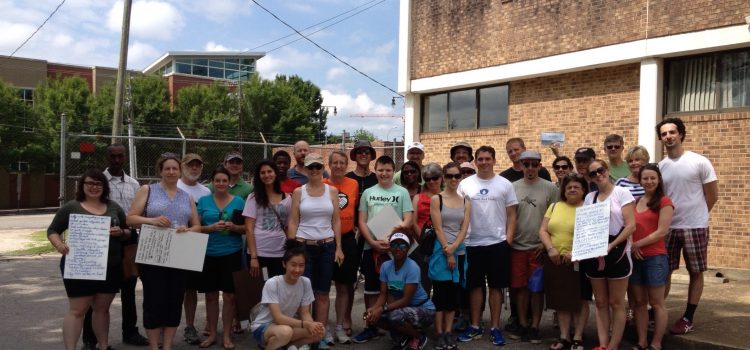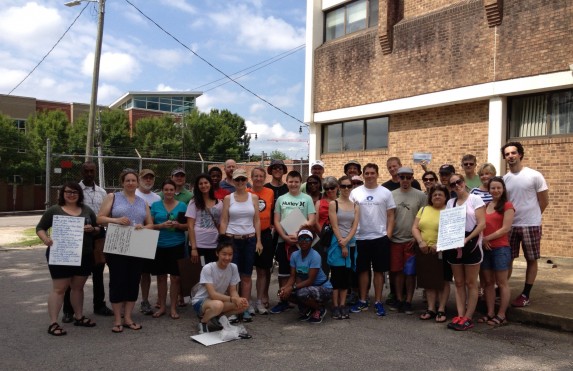For the past seven years I have been a founding board member of Advocates for Health in Action. As the current chair, the mission has always been to work with organizations, agencies, committees and inspired individuals to promote active lifestyles and healthy living in Wake County.
Over those seven years, we started at WakeMed, moved to the YMCA and have been supported by a wide variety of organizations including: the John Rex Endowment, the Blue Cross Blue Shield Foundation and Wake County. As we continue to grow and make changes there is one trend that continues to rise to the surface, as not only a national trend, but also a local trend in Wake County: Local healthy food in today’s communities has almost been forgotten, as we default to large global distribution systems that have taken the place of the local farmer and corner store.
For a variety of reasons, any of which are good, we as communities and as a country are beginning to rethink our local food options and distribution systems that supply our metaphorical daily bread.
From a single mom whose child is home from school for the summer – dealing with food insecurity on a daily basis.
To the Wake Public School System – where local food has long been replaced with tater tots, french fries, pizza, and soft drinks – all of which are adding to our kids obesity problem.
To the new graduate from N.C. State – who has never had her hands in the soil, but is now interested in making cheese or growing herbs in an urban setting.
To the family farmer – who makes their income on soybeans, but could make 10x that amount if there were markets for their locally grown tomatoes.
To our county – where we can begin to think about “farmland preservation” and our agrarian heritage as not just something nice to do because it reminds us of the good ole days, but because it feeds us with better tasting and more wholesome food, while creating jobs and income for our citizens.
To the restaurant – who wants to serve local food because their chefs like it, their customers love it and because it puts money back into the local economy.
To the local neighborhood or recent immigrants – who spend their weekends tending the community garden where they grow food, but what they are really growing are communities.
To the churches – who enroll their members in growing food for the Interfaith Food Shuttle and the food pantries, giving a sense of purpose to the grandmother, the master gardener and the teenager, who for the first time sees where a radish really comes from.
To the struggling family – who can add home grown vegetables to the table while adding to their annual income in what was once called a “Victory Garden” could now be seen as a way of life.
And finally, to those who see the sustainability, reduced carbon loading and less energy use by buying local, becoming self sufficient and putting our people back to work and adding income to the local economy all as a good thing.
Nothing, in my 61 years of life, seems to come close to the impact local food can have on so many parts of our lives, as well as the community. Did I mention that it also tastes better and is better for you?
All of these are just a few of the benefits of local food. So why are we not doing more? Well, actually it is hard to do. We have long lost our local distribution systems as we have defaulted to large corporate global players. It’s hard getting cities to allow – much less sell – produce from community gardens. It’s hard getting stores to buy from the local farmer. It’s hard to get the public school system to think about, much less buy, from local suppliers.
Until recently, it’s been hard convincing a local restaurateur that local food has a competitive advantage. It is hard getting the distribution system to match up supply and demand in an ever increasing economy of scale. But because it is hard, is exactly why it’s such an incredible opportunity and why we need to do it.
If Wake County can get this right, we can lead North Carolina, the Southeast and the United State in growing an economy of local food. We can put our citizens back to work and start to feed the hungry, as well as start to get local food back in our schools and stores. We can become healthier, happier, more prosperous, more productive, more sustainable and more self-sufficient all in one concept. A concept that connect us as humans.
Long live this incredible and growing trend called “local food.” Along with making us healthier and happier while creating a greater sense of community, it might just save the planet.
Long live local food in Wake County. Let the movement begin.
Photo was part of “Second Saturday” gathering to explore the proposed “Raleigh Food Corridor,” with Erin White of the Community Food Lab. More can be found at www.raleighfoodcorridor.org







